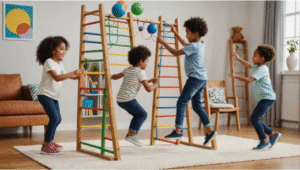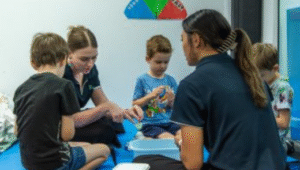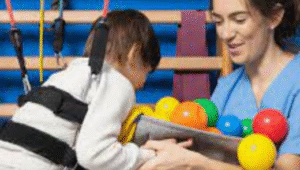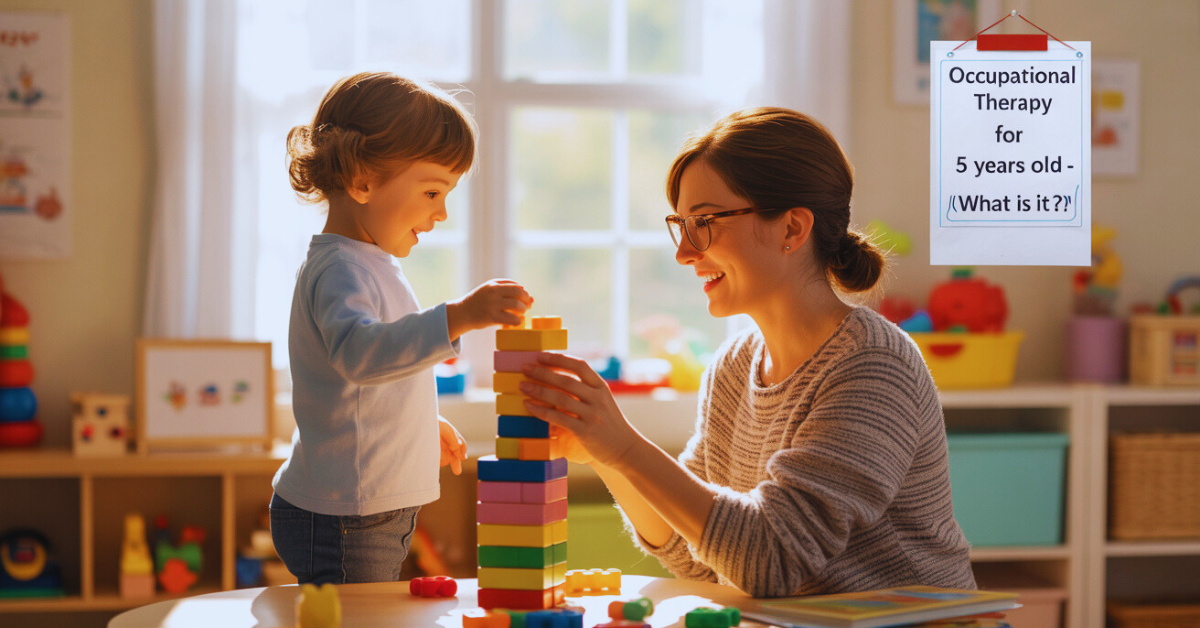Does Your Child Need Help? Signs They Could Benefit from Occupational Therapy
A child could benefit from occupational therapy if they are struggling with basic activities such as writing, eating, or playing with toys.Through occupational therapy, children born with motor retardation or sensory deficiencies and with many complications in daily undertakings get a fresh breathing life . This treatment is particularly essential in children with autism disorders, and this is because it deals with the difficulty that autism presents motor skills development. Today, we will dwell upon the clues that may testify to the fact that a child may need occupational therapy, its advantages and disadvantages, treatment methods, and the way to incorporate it into your everyday child.

The Question Is What Is Occupational Therapy?
Occupational therapy (OT) enables children to carry out activities needed in their daily lives. A pediatric occupational therapist focuses on a child in terms of enhancing fine and gross motor abilities and sensory processing as well as social skills. The treatment involves use of simplicity in day to day activities by means of playing games, exercises and routines that help the children gain independence and also gain confidence. If a child could benefit from Occupational therapy, it is because they might require assistance in these fundamental areas in order to live a more independent life.
The Importance of Benefit from Occupational Therapy for Children
Occupational therapy does not only mean acquisition of simple tasks. It is an effort to enable and enable children to acquire confidence and abilities required when taking care of themselves, at school and socially. Occupational therapy may be helpful to a child in case of developmental retardation or difficulty performing tasks like buttoning a shirt, using a fork and spoon, or taking part in a group activity. OT enables children to acquire knowledge on how to undertake such tasks on their own, therefore, providing them with the skills in school and life.
How Autism Affects Motor Skill Development
In a number of ways, autism influences motor skills development. Most children with autism are encountered with delays both on fine and gross motor skills. Fine motor skills are the little movements such as using a pen or fastening a shirt whereas the gross motor skills are those bigger movements that include walking, running, and jumping. In a child with autism, the skills might not have been developed yet and therefore it becomes more difficult to carry out activities on a daily basis. Children with autism can be helped by the usage of occupational therapy which can teach the child how to develop the said skills so that they can be more independent and self-confident.
Signs That Your Child Could Benefit from Occupational Therapy
If you’re wondering whether a child could benefit from occupational therapy, look for the following signs:
- Delay in Motor Skills: Late motor skills might indicate when your child has poor performance in crawling, walking, and running.
- Sensory problems: In case your child is hyper-sensitive to lights, tones, or touch or refuses to experience some kinds of sensation, occupational therapy may assist in sensory processing.
- Self-Care Problems: When your child cannot dress, brush his or her teeth, or feed himself or herself, then occupational therapy will be helpful.
- Clumsiness: Makes frequent falls or experiences difficulty in balancing when playing, this may indicate that one needs occupational therapy.
- School Readiness Issues: In case your child has a pencil grip, sitting or command difficulties, OT can get them ready to attend school.
When you observe these signs, then it is always advisable to visit an occupational therapist to explore the needs of your child.

How Occupational Therapy Helps with Fine Motor Skills
Benefit from occupational therapy fine motor skills are important skills, writing, eating, and dressing in particular require fine motor skills.If your child is struggling with these tasks, a child could benefit from occupational therapy. Some of the activities that OT resorts to to make the children gain hand-eye coordination, muscle strength and fine motor control are coloring, drawing, using scissors and beads threading. Such activities involve making learning enjoyable and also enhancing the skills of the child in handling daily tasks more easily.
How Occupational Therapy Supports Gross Motor Development
Gross motor skills entail bigger motions such as climbing, running, and jumping. Autistic children can find failure in performing such activities because of their muscular weaknesses, coordination, or balance. Occupational therapy allows children to develop their muscles and enhance their co-ordination by getting them to exercise using jumping, hopping and balancing. These activities make the kids develop strength and confidence which makes them play and exercise.

How benefit from Occupational Therapy Addresses Sensory Processing Issues
Sensory processing disorders are listed as a problem associated with many children with autism, that is they are not able to process information sends supervision of touch, sound, or light.To give an example, child with autism may be over-sensitive towards certain textures, or they may find any loud noise too much to handle . A child could benefit from occupational therapy to help them cope with sensory overload. OT can educate the child in controlling these sensitivities in a manner that the individual is able to pursue daily activities without being overwhelmed.
When Should You Start Occupational Therapy?
The most important thing is early intervention. The earlier you start on occupational therapy, the more positive results will be achieved on behalf of your child. A child could benefit from occupational therapy if they’re showing signs of developmental delays or sensory issues. Early treatment will also assist children to acquire skills needed at this age before they become more disadvantaged. Occupational therapy at an early age enables children to succeed at school, at home and in social life.
How Benefit from Occupational Therapy Can Help Kids with Autism
Children with autism can significantly use occupational therapy.It provides the solution to the motor, sensory processing and social interaction deficiency that the problem children exhibit when affected with autism . A child could benefit from occupational therapy if they struggle to engage in everyday activities due to sensory overload or motor delays. Therapists also use structured play and sensory activities so as to bring order under which the children with autism can acquire skills that would enable them to relate to the surrounding environment as well as the surrounding individuals.
How Benefit from Occupational Therapy Improves Social Skills
Children with autism might not be able to interact with their peers and follow social rules which is a challenge to them when learning social skills. Occupational therapy aids a child to exercise such skills in groups, role-playing activities and other interactive group activities. Children get the skills of sharing, taking turns, and communicating. Social skills are the skills children develop when they can practice in a safe atmosphere of support. The children will be more secure in dealing with others.

Benefit from Occupational Therapy for Children
Occupational therapy has numerous advantages particularly among children who have motor deficiencies, impaired sensory processing, and problems carrying out activities daily. The main advantages are the following:
- Enhancing Motor Skills: Assists in the development of fine and gross motor skills of children in activities such as writing, eating or playing.
- Greater Independence: Children gain greater independence in activities of self-care like dressing up, brushing teeth and toilet use.
- Enhanced Social Skills: OT promotes peer interaction hence enhancing a child to be able to communicate and play with others.
- Increased Attention and Concentration: OT also contributes to focus and following instructions which is very important in readiness to school.
- Emotional rewards: When children are successful in accomplishing things they develop confidence and self-esteem, which makes them more confident and have a good feeling of their capabilities.
Causes of Delays That Occupational Therapy Can Address
Occupational Therapy can be required by children in case of different underlying reasons:
- Autism: Autism spectrum disorder usually affects motor abilities, sensory processing, and interpersonal communication, which is why OT is critical in this condition.
- Development Delays: Others, it takes some children a longer duration of time to develop the motor skills or even require assistance to get on round with the other children of their age.
- Sensory Processing Disorder: Children that can be either over sensitive or under sensitive to the sense can use OT to help them manage the responses to the senses.
- Trauma or injury: OT can be used to help a child recover and relearn in a situation that a child has had some physical injury or trauma.
- Neurological Disorders: Some issues like ADHD or cerebral palsy can result in an underdevelopment of motor skills, and they can be resolved through the use of occupational therapy.
How Occupational Therapy Helps Children Become More Independent
One of the goals of occupational therapy is independence. A child may be recommended occupational therapy in case he or she has problems with basic care activities such as dressing, eating, or bathing OT helps children master doing these activities without help and as such enhances their self-confidence and makes them feel good about themselves. The OT aim is to encourage the children to do things on their own and boost their self-reliance and confidence since the goal is to enable the children to carry out their daily living tasks.

The Role of Parents in Supporting OT
Benefit from Occupational therapy is essential to the progress of a child, and parents have a significant role to play in that aspect. Parents can also encourage fine and gross motor skills at home by providing their child with such activities that will help improve them, after learning to do it at the therapy. This may involve such activities as writing practice, puzzles or balance-enhancing games. In conjunction with the occupational therapist, it is possible for the parents to be certain that your child keeps up gaining ground even when they are not in a therapy session.
The Benefits of Early Occupational Therapy
The sooner the child is exposed to occupational therapy, the higher the possibility of them getting to the same level with the other children. Early treatment will assist a child in establishing motor skills, sensory processing skills, and social skills that will be instrumental in their life duration. Occupational therapy has a great influence on children at an early age since they are well-equipped to face school and more inclined to achieve in a social environment. A child could benefit from occupational therapy if their challenges are addressed at an early age.
How to Integrate OT Activities into Daily Life
You do not have to wait until therapy sessions take place to assist your child. You can do a plentitude of activities at home to help your child develop his or her motor skills. For example:
- Improving the coordination can be achieved by balance games like jumping or hopping.
- The fine motor skills can be enhanced through drawing or writing which helps in the development of hand muscles.
- Sensory processing may be assisted with sensory activities such as playing with touchy-feely toys or relaxing music.
Parental involvement in the development of the child could benefit from occupational therapy process can be achieved by inculcating these activities in their daily routine.
The Long-Term Effects of Occupational Therapy
A child could benefit from occupational therapy by gaining the skills necessary to live independently. In the long run, children enhance motor, self help and socialization skills which enables them to develop self confidence and independence. The reason that occupational therapy can be life-changing is based on the long-term effects of the therapy, as it makes children reach their full potential.
How Schools Can Be Helpful To Occupational Therapy
Child could benefit from Occupational therapy is practiced in many schools with students having developmental delays or even disabilities. Additional resources can be used by a school as it can offer modified desks, an extra amount of time to perform a task, and sensory objects. The occupational therapists frequently coordinate with teachers and make sure that students are being assisted as they are supposed to. In case your child is at school, collaborate with the school so that he or she can get the right occupational therapy services.
How OT Helps Kids in Different Cultural Environments
Cultural practices may affect the development of children. There are societies that promote pursuit of physical activity early in life and there are those that restrict movementsU tilizing the assistance of occupational therapy the children of any culture may develop important motor skills to succeed. Child could benefit from Occupational therapy would help a child regardless of the culture he or she is in as it could equip him or her with skills of carrying out daily endeavors.
Conclusion:
A child could benefit from Occupational therapy may be useful to a child in cases where his/her motor skills or reaction strengths are weak or in his/her general activities. Early treatment and help from a qualified occupational therapist can enable children to be more independent to perform day-day chores. Do not hesitate to seek help. Early therapy makes huge differences in terms of the development process and future prosperity of your child.
Frequently Asked Questions (FAQs)
1-What is pediatric occupational therapy?
Occupational therapy also assists children with developing appropriate skills in their everyday activities, including dressing, eating, and playing; this is done when there is a poor performance in such tasks because a child has development delays or autism.
2-What is the right age to start my child with occupational therapy?
Occupational therapy can prevent development delays, so it is worth considering it at an early age in the case of your child experiencing delays in their motor skills and sensory abilities and exposure to challenges in everyday activities.
3-Will occupational therapy be of assistance to children with autism?
Occupational therapy will assist children in autism to develop motor skills, deal with sensory processing and interaction. Yes.
4-What can I do to encourage my child in his or her occupational therapy?
There are several ways to support your child, and one of the most effective ones is the motor skills activities that may be done at home, like drawing, games, or household assistance.
5-What is the duration of benefit from occupational therapy of a child?
Length of treatment is a factor of the need of your child. Those children who may require the therapy may take several months, but further progress may take some children.

